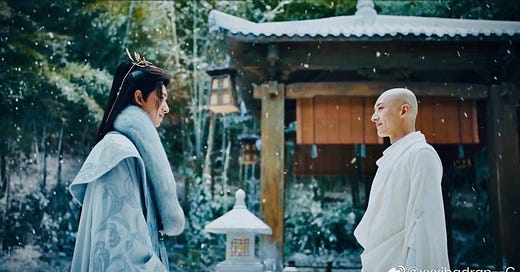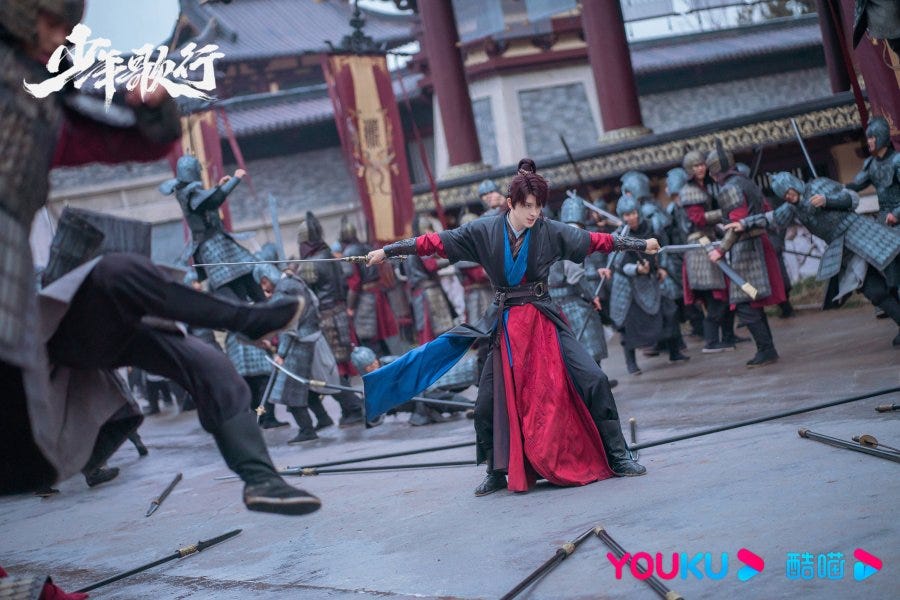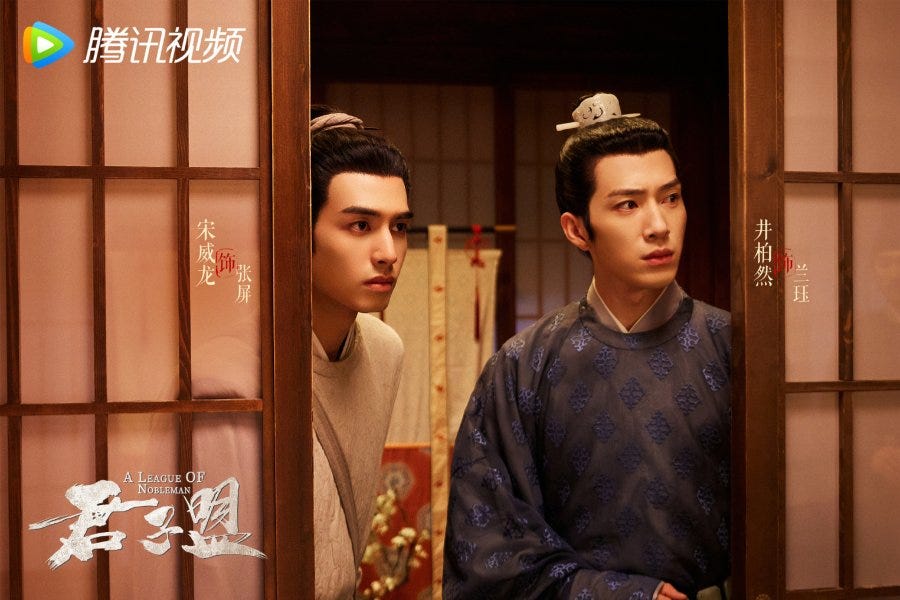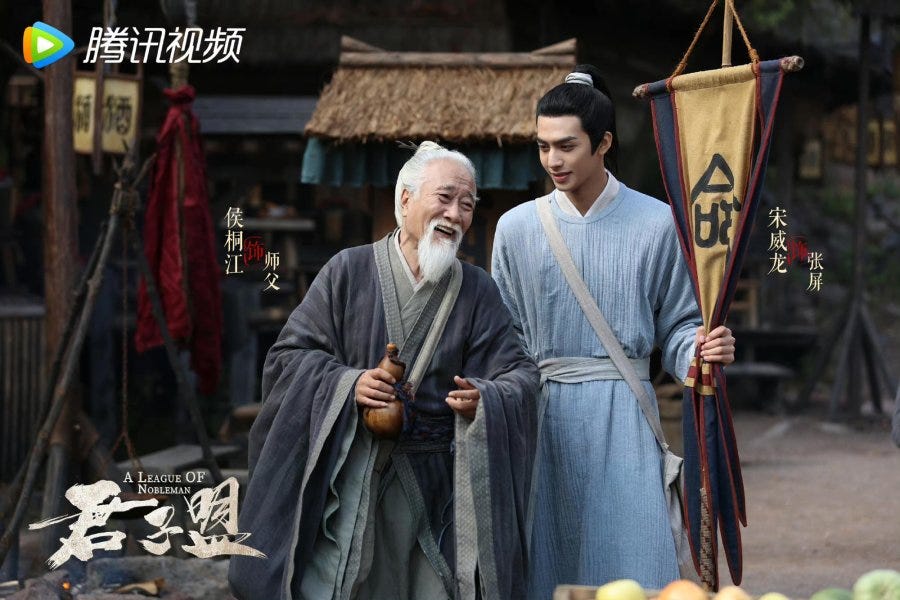A sign that someone has taken on too many different dramas is the fact that it takes her/him far too long to finish dramas started a while ago. But there’s little doubt that C dramas have had an incredible start to the year with shows like The Blood of Youth, Meet Yourself, A League of Noble Gentlemen and The Three Body Problem. I look forward to watching The Three Body Problem with the other half at some point because we’ve both read the Hugo award-winning novel. In fact he’s read the entire series. The trailers have me pumped — it looks like a quality production — but there are just so many hours in a day.
At last I’m done with The Blood of Youth. I probably would have been done sooner if I’ve been more restrained with my social media participation. I usually am but occasionally I lapse. It was a mighty 40 episodes to plough through at times but in the end worthwhile for a wuxia, superhero fan. These days, it’s unequivocally true that the best superhero shows are made outside of Hollywood because the values that underpin superhero narratives are no longer embraced by the people who make these types of stories.
The Blood of Youth succeeds because it is unabashedly a wholesome celebration of friendship, camaraderie and loyalty. A lot of criticism has been directed at the subpar development of romance lines but in a show like this I don’t mind because loyalty demonstrated in self-sacrifice is that all-encompassing transcendent value that shapes relationships and choices in the storyline. Rather than being secondary, romance is subsumed by that category of loyalty. Romance’s primary value is seen mainly in commitment to the big picture or The Cause. Being the best in the world, a common wuxia trope, is relegated to irrelevance by the end. What matters is having healthy interdependent relationships that come together for the greater good.
*Minor spoilers ahead*
A part of this story follows the usual trajectory of the classic wuxia mythos as seen in Lei Wujie’s journey to be the world’s greatest pugilist. He’s comically brash and simple-minded. What he lacks in brains (and directional sense) he makes up for in courage and sincerity. Perhaps this is why he and Xiao Se can become friends because opposites can better complement each other especially in times of danger even when egos are on the line. It allows Lei Wujie to develop as a martial arts pugilist and Xiao Se to show off his skill as a strategist and ideas guy. This friendship too brings about much humour and gradually the two genuinely become best friends while trading good-natured insults.
However the most important contrast in this show comes from Xiao Se and his younger but far more nakedly ambitious brother Xiao Yu who wants to be emperor. It’s not that much of a spoiler to say that he’s behind much of the upheavals that happen not just in jianghu (the martial arts world) but in chaoting (the imperial court). Xiao Se is something of a genius undoubtedly but what makes him a standout is not his martial arts talent or his outstanding intelligence but a kind of understated wisdom that’s beyond his years and those that might be considered his elders. It’s obvious that the throne has never been his priority — he’s an adventurer at heart — although he is someone who should be in charge. He understands something about power that many characters in this show don’t: Power becomes corrupting when it’s preoccupied with the self. Xiao Yu is willing to sacrifice others so that he can get what he wants. Xiao Se, on the other hand, is willing to sacrifice himself to save others. Yes, love does conquer all but it isn’t romantic love. It’s love of companions, love of the nation and love of the people. Xiao Se inspires people to go outside their comfort zone because he is willing to do the same.
From the start I always thought that Xiao Se was the most intriguing character in the show partly because he didn’t reveal his true identity for the longest time and partly because he had the brains to survive despite not having great martial arts. He seemed at first to be a supporting character while others were proving themselves on the battlefield but little by little it’s a case of 藏龙卧虎 or hidden dragon crouching tiger. He was biding his time hanging around this motley crew to find out what Heaven had in store for him. In that process he found healing and a renewed sense of mission as a son of Beili.
The great mystery of how Heaven’s sovereignty and human responsibility intersect has been debated undoubtedly since time immemorial. What mere mortal knows where heaven’s will ends and man’s responsibility begins but clearly choices inevitably have consequences that go beyond the individual. There are plenty of people with regrets in this show. Young and old. The powerful and the weak. Often there’s just no second chance for poor choices made in the past. That said, poor choices can also provide opportunities for others down the line ie. some good can come out of negative situations.
There’s a fascinating footnote towards the end about blame and victimhood. Xiao Yu names himself as one of the oppressed and this gives him the rationale to do all manner of dastardly things including harming his own mother. The irony it turns out is that all the time he’s simmering with resentment against his mother and plotting against his brothers, he has been the recipient of self-sacrificing motherly love that neither of his half brothers enjoyed. He has been too busy being angry to appreciate what he does have. The path of self-destruction is one of his own making.
Although I have a list of things I would have liked more of, my biggest beef with this show would have to be the pacing. The show could have been trimmed. Some episodes are exposition heavy and often it feels like C dramas haven’t heard of the “show don’t tell” principle in storytelling. It’s not a rule I hold to stringently but I don’t see the point of rehashing information that’s already been seen or said a seen or two ago.
Considering C dramas don’t often stick the landing, this one does a better-than- decent job. By that I mean that it isn’t a dog’s breakfast trying to get everything wrapped up in the finale. In fact, I find the episode before the finale one of the best episodes in the entire series. It has the right amount of thrills, heart and everyone gets their just desserts. The fight scenes though generally good, don’t really compare with something much more down-to-earth like Fox Volant. It tends to be CGI heavy. So while it’s visually spectacular much of the time, there comes a point where the CGI rendering of the fights feels repetitive.
Overall the casting is right on the money. Considering the cast of a thousand, it does an excellent job keeping tabs on the characters. There might be the odd exception but I’m not bothered by exceptions here because Li Hongyi is well-cast as Xiao Se. Considering his age, he does a bring an adequate amount of gravitas to the role while peppering it with the right amount of snark when called for. While he can carry the male lead role, he still has some way to go though in terms of facial nuance.
Despite the minor criticisms listed here, The Blood of Youth is highly entertaining eye feast and owes much more to shonen manga/anime stories of the past few decades than classic wuxia.
It seems audiences are split down the middle over A Noble League of Gentlemen — a show that’s… in the vernacular… very much my jam. It feels like we’ve been waiting for this one for the longest time. It’s first and foremost a whodunit that is set in a politically-charged imperial court where a ruthless Empress Dowager rules behind the scenes with an iron fist. The show inevitably ventures into the realm of political negotiation which raises the stakes for the show’s primary sleuths. It’s clear too even from the start that survival (political or physical) takes precedence over the truth. The detective side of things reminds me of a television favourite, the UK series Jonathan Creek — certainly in its use of illusion and misdirection all throughout the series. The show, I believe, is at its best when the team are solving cases and getting deep into the weeds of how the perpetrators got away with it. This is where the writing shines in its eye for meticulous detail.
I started this for the very charismatic Jing Boran. I last saw him in The Psychologist (and its concluding follow-up He Dun’s Happiness) where he was one of the show’s bright spots. In my opinion he’s even better here when his versatility is given room to breathe. Jing Boran is Deputy Minister for the Ministry of Rites, Lan Jue (style name: Peizi). Much of the show sees him solving mysteries in the capital of Great Yong with Song Weilong’s Zhang Ping that seem to have links to a horrific series of events 20 years earlier in a place known as Moluo Village. On that occasion Lan Jue’s father was accused of treason and was executed accordingly. The son, however, is now on a secret mission to clear his father’s name. The relationship between Lan Jue and Zhang Ping is born out of suspicion and conflict but when they find common cause, it’s Mycroft and Sherlock against some rather formidable foes. And yes, there is a Moriarty lurking in the background pulling strings. It took me a lot longer to warm up to Zhang Ping whose rigid adherence to rules makes him impetuous and lands him into all kinds of proverbial hot soups — an appropriate metaphor considering that he runs a noodle street stall to pay for his living expenses. He comes to the Big Smoke as a scholar studying for the imperial exam while moonlighting as a detective who sticks his nose into everything suspicious for love of truth. At times he’s a bitter pill to swallow. But the sugar that helps the medicine go down is the repeated acknowledgement by the script that this is a flaw and backs that up with actual consequences for his busybody restlessness. He’s trying to be a black and white guy in a world of grey power plays. It’s akin to playing his own game in someone else’s backyard with no clue as to what their rules are.
As the title suggests, this is a male dominated cast that is unabashed in it celebration of masculine archetypes — father figures, mentors, protectors, warriors, brothers — just to name but a few. The beauty of this show is that it isn’t just about the leads Lan Jue and Zhang Ping. It’s a team effort that is underpinned by a brotherhood that transcends status and wealth. Deep connections can be made not just among intellectual equals but even between masters and servants.
The inclusion of the mysterious Shulin so late in the story feels like a double-edged sword. The actor, Wang Duo, is very good at drawing out the character’s complexity and yet even with all the nuance in the performance, his part in the narrative and its resolution ends up far less satisfying than it might have been because the show is determined to say something about the corrupting tendency of absolute power. The resolution is logical for the show that transpired but one is left wondering if making justice a casualty in all this is worthwhile for the individuals who worked so hard to gnaw at the truth.
It is hard to say much more without giving away spoilers. While there are seemingly disparate cases, it becomes increasingly obvious that they are intertwined. As a rule I have nothing against Bad Guy plots making bombastic statements about the world. However, it has to be done well. When it isn’t done well, it’s like moustache twirling villains doing a monologue and bragging giving their adversaries time to get their act together. It’s about theatre. Restoration takes a back seat. The purpose too with the Bad Guy plot is to create a moral dilemma — an unnecessary one — that’s probably meant in part to be a coming-of-age moment for Zhang Ping.
This is one that I found thoroughly immersive and beautiful to look at. I’ve heard that this was heavily censored but this is one occasion I had no problems with the editing because I never felt that I was missing out on anything essential. In fact, the pacing of this show not bogged down by fillers or detours was very much my cup of tea. Frankly I wish more C dramas would be equally disciplined in its storytelling.








You should give Warm On A Cold Night a try! It's also an investigation drama although it's really the OTP that was the draw for me.